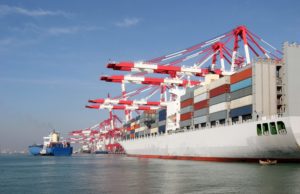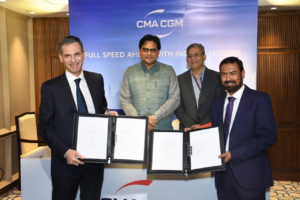The Danish giant A.P. Moller – Maersk said it is continuing to “build momentum” in the second quarter of the year, reporting volume growth across all segments, while the Ebit margin reached 7.5% compared to 1.4% in the first quarter.
Maersk noted increased profitability in the Ocean segment, solid growth in Logistics & Services and outstanding performance in Terminals.
The Copenhagen-based company, viewed as a barometer of world trade, has reported that revenue decreased by $217m to $12.8bn ($13.0bn), while the Ebitda decreased to $2.1bn ($2.9bn), mainly related to a decrease in ocean of $852m driven by a negative timing effect from rates and higher costs.
According to the report posted by the owner, the company’s Ebit stood at $963m ($1.6bn), which was below the previous year.
“Our results this quarter confirm that performance in all our businesses is trending in the right direction,” stated Vincent Clerc, chief executive officer of Maersk.
“Market demand has been strong, and as we have all seen, the situation in the Red Sea remains entrenched, which leads to continued pressure on global supply chains. These conditions are now expected to continue for the remainder of the year.”
Clerc added, “We have invested in additional equipment in all our businesses to adapt to the situation and continue supporting our customers through the disruptions. As we look ahead, our focus remains on leveraging organic growth while exploring opportunities for value-accretive acquisitions particularly in Logistics. We will maintain tight cost control and high asset utilization, and further execute on our fleet renewal program.”
Maersk said it raises its financial guidance and now expects global container market growth to be between 4-6%, aiming to grow in line with the market, compared to the previous expectations of towards the upper end of 2.5-4.5%.
Additionally, Maersk now anticipates CAPEX to be between $10 and $11bn for 2024-2025 (previously $9-10bn) due to ongoing fleet renewal.
“The guidance for 2024 is revised upwards to an underlying Ebitda of $9-11bn (previously $7-9bn), an underlying Ebit of $3-5bn (previously $1.0-3.0bn), a free cash flow of at least $2.0bn (previously at least $1.0bn) and CAPEX in 2024-2025 of $10.0-11.0bn (previously $9.0bn-10.0bn),” pointed out Maersk.



